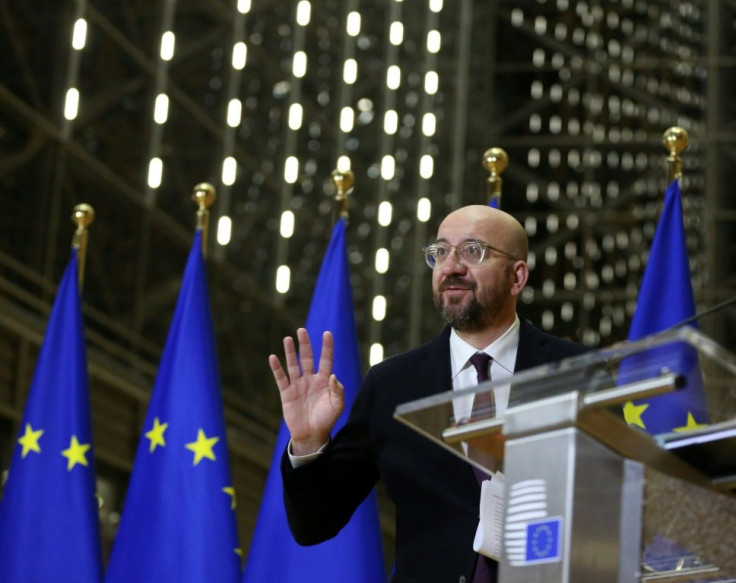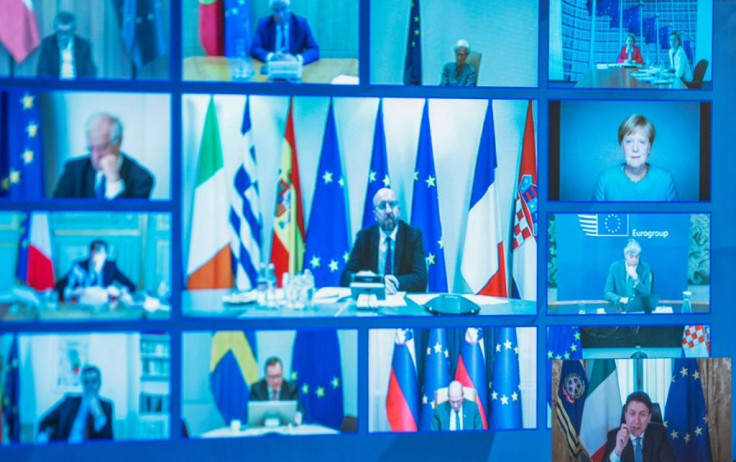Divided EU Leaders Inch Towards Virus Rescue Plan

Divided EU leaders inched their way towards an economic recovery plan for virus-hit Europe on Thursday as the European Central Bank chief said that action was urgently needed.
The EU's 27 leaders met by video conference as fresh data showed that the European economy was in freefall, struck down by a series of national lockdowns to thwart a wave of more than 110,000 confirmed COVID-19 deaths across the bloc.
Bloc member states have been bickering for weeks, with hardest-hit countries such as Spain and Italy urging richer nations such as Germany and the Netherlands to demonstrate unprecedented solidarity.
After four hours of talks, the leaders agreed to task the European Commission, the EU's executive arm, to come back with a plan early next month that would both gauge and answer the needs to fix the European economy.
"A consensus is being formed to strengthen Europe's strategic autonomy" among the 27 member countries of the European Union, French President Emmanuel Macron said after the talks.
Given bitter recriminations ahead of the talks, expectations for a breakthrough had been low.
As expected, leaders agreed that any plan would take place through the EU's long-term budget, the Brussels-based money pot that usually goes to farming subsidies and development aid to eastern and southern Europe.
This was demanded by German Chancellor Angela Merkel, the bloc's most influential leader who has stood firmly against more ambitious proposals backed by Italy and Spain, most notably joint EU borrowing.
"The European budget has for decades been the tried and tested instrument for common tasks in the EU," Merkel had told lawmakers in Berlin ahead of the crunch talks.
The next battle will be over by how much to boost the EU budget and whether the EU commission, which handles its spending, will be able to raise even more cash by borrowing.
That debate will again split Europe along north-south lines, with Germany, Netherlands and other so-called "frugals" urging for less money and any aid to come through loans with conditions.

Italy, Spain and France meanwhile will call for grants or direct aid and an ability for Brussels to raise far larger amounts on the financial markets.
The next budget "has to adapt to the new circumstances, post corona crisis, we need to increase its firepower," said European Commission chief Ursula von der Leyen after the talks.
But even before the pandemic, months of negotiation of the EU's 2021-27 budget already caused bitter and unresolved fights among the EU leaders.
The small step on Thursday came as ECB chief Christine Lagarde told the leaders that in the bank's worst-case forecast, the bloc's gross domestic product could fall by as much as 15 percent in 2020 as a result of the pandemic.
She warned the 27 members that "there was a risk of acting too little, too late," a source said.
For now, Lagarde has led the fight against staving off a recession in Europe, having already released 750 billion euros ($811 billion) in monetary stimulus, but has insisted EU governments must do more.
It was the EU's fourth video summit on the virus crisis in seven weeks and sources said the leaders would need to meet again soon to assess the commission's plans.
The summit took place on the day a closely watched business survey said the eurozone economy was experiencing an "unprecedented" collapse.
"The ferocity of the slump has... surpassed that thought imaginable by most economists," said the chief economist of IHS Markit Chris Williamson.
The cost of rebuilding will be enormous and various figures have been bandied around for the recovery fund, though no final amount was discussed on Thursday.
Mario Centeno, head of the Eurogroup of eurozone finance ministers, has suggested a range of 700 billion to 1.5 trillion euros and French Finance Minister Bruno Le Maire has mooted one trillion.
© Copyright AFP 2024. All rights reserved.





















